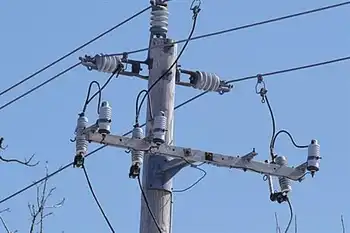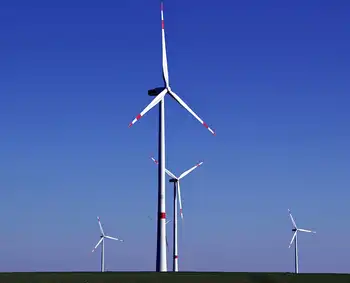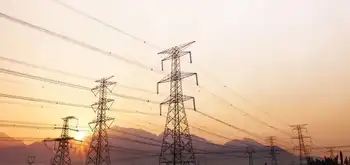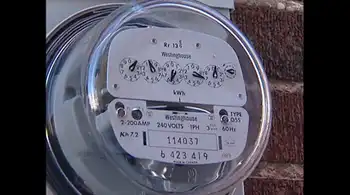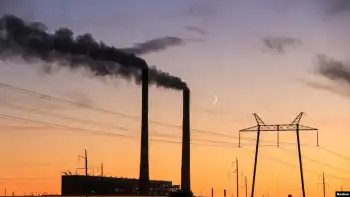DOE emails to wind lobbyists cast a cloud
By Investor's Business Daily
High Voltage Maintenance Training Online
Our customized live online or in‑person group training can be delivered to your staff at your location.

- Live Online
- 12 hours Instructor-led
- Group Training Available
The e-mails obtained from a Freedom of Information Act request show how, starting last April, lobbyists at the American Wind Energy Association became alarmed that lawmakers were citing a study by Spain's King Juan Carlos University. The study found that Spain's massive investments in wind power cost 2.2 jobs for every "green" job created.
The study came out in early 2009 just as the wind lobby was building up its presence in Washington, hoping it could score big in an energy bill then being debated in Congress. Industry lobbyists feared the Spanish study would halt momentum for pro-wind legislation.
The e-mails show the wind lobbyists shared their concerns with DOE employees, who agreed the study needed to be refuted. In August, DOE produced a white paper specifically attacking the study.
For example, e-mails show the lobbyists requesting to know when the report would come out and DOE employees hustling to get it published because it was late.
"Is it okay if we send out our response (paper) to colleagues at AWEA and CAP? We promised it to them many weeks ago. It will soon be irrelevant," said energy analyst Suzanne Tegen, co-author of the DOE paper, in a July 29 e-mail to colleagues. CAP refers to the liberal Center for American Progress, which has pushed for renewable energy subsidies and has close ties to the Democratic Party.
CAP Senior Fellow Dan Weiss told IBD the center wasn't involved in drafting or editing the report, though it did promote it on its Web site.
The conservative Competitive Enterprise Institute obtained the e-mails via a Freedom of Information Act request and shared them with IBD. Many of the messages were redacted.
The e-mails are mainly between employees at DOE's National Renewable Energy Laboratory.
Chris Horner, a senior fellow with CEI, is pushing further FOIA requests to get the remaining documents. He argues that the e-mail timeline indicates the Energy Department produced its study at the wind lobby's request.
"It doesn't seem to be the department's idea," Horner said. "That is clear."
AWEA CEO Denise Bode called charges it got DOE to produce the study "absolutely false." Yes, the association worked with the administration on the issue, she said, but argued it was just how business is done in Washington.
"Anytime (the DOE's labs) are doing research on something, they usually have independent advisory groups from the industry review what they are saying to make sure it is accurate," she said.
Bode added that this was no different from how things were done under President Bush.
"Have we had a good working relationship? Sure, just as we did with the previous administration," she said.
Gary Schmitz, external affairs officer for NREL, said the agency did the study on its own simply because it believed strongly that the Spanish study was badly flawed.
"This whole idea that we engaged in some lobbying campaign is absolutely not true," he said.
Schmitz concedes NREL staffers kept AWEA in the loop as they did the response — AWEA even peer-reviewed the response study — but said there is nothing unusual about that. They need to work with those industries to research renewable energy.
"Yes, we work very closely with industry, and to suggest that that is wrong is to turn the whole history of R&D and public-private partnerships for R&D" on its head, Schmitz said. The e-mails, he argued, merely show the existing relationships between the NREL researchers and others in the renewable energy industry.
"Quite frankly those relationships go back a long way," he added.
David Levinthal, spokesman for the Center for Responsive Politics, which monitors lobbying, says "the public should always be concerned about situations where special interest groups are... allowed to effectively be the fact checkers."
Wind lobbyists' concerns were first raised when the Spanish university's April study asserted that every subsidized renewable energy job in the country cost it 2.2 jobs in the broader economy due to inefficiency and high costs.
"The AWEA policy people are quite concerned about a recent report published in Spain," wrote Eric Lantz in an e-mail to fellow NREL colleagues dated May 12.
The next day, Elizabeth Salerno, an AWEA analyst, responded to a colleague at the Union of Concerned Scientists regarding the Spanish study. The response was also sent to the NREL's Tegen.
"It is critical that we respond, this thing won't die and its (sic) doing a good job of undermining our green job message," Salerno said.
The day after that — May 14 — David Kline, a top analyst at NREL, e-mailed numerous colleagues with the subject line, "Damaging Spanish study continues to gain exposure." In it, Kline noted reports that "members of Congress are beginning to use this report to argue against legislation supporting investment" in renewables.
In another Kline e-mail later that day to NREL colleagues, he said they should discuss "whether we have something to add" on the subject of the Spanish report.
"Sounds good, David. The AWEA folks are wondering what we'll do, so if this is our plan, I'll let them know," Tegen said in response.
Later that month, Tegen e-mailed AWEA's Salerno to request a talk: "Eric (Lantz) and I are drafting the response to this report and would like to connect with you about it."
The eventual NREL report slammed the Spanish study, saying it "deviates from the traditional research methodologies used to generate jobs impacts" and lacks transparency and supporting statistics.
The report also says the Spanish study "fails to account for the important issues such as the role of government in emerging markets."
CRP's David Levinthal says it's not unusual for the government to get input from private industry. The law is fuzzy on where the boundaries are.
"There are no hard and fast lines as to what is or is not appropriate," he said.
It's clear the wind lobby has emerged as a major player on Capitol Hill, Levinthal said.
The wind industry spent $5 million on lobbying last year, up from $1.7 million in 2008. It has 36 lobbyists, up from 2 in 2004.
"They've gone from being effectively a lobbying nonentity to a major lobbying force just in about five years time," Levinthal said, adding: "That may indicate why they are getting a little more interest from the federal government."
They've not had much to show for it so far. The House cap-and-trade bill would have set a 20% renewable energy mandate by 2021. But the legislation stalled in the Senate.
Lawmakers are gearing up again, and more than 100 wind energy company executives have come to Washington to plead their case for renewable energy mandates.
But the Spanish study isn't the only evidence that green jobs come at a stiff price. President Obama in January announced $2.3 billion in grants that he said would create 17,000 cleantech jobs. That's $135,294 per job. California's nonpartisan legislative analyst said Monday the state's climate law will likely cost some jobs.





